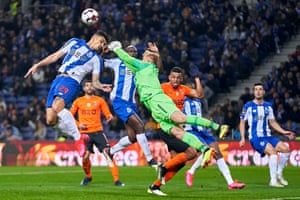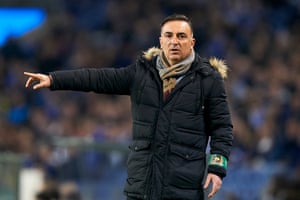[ad_1]
The sun is shining in Braga and, to prove the point, Carlos Carvalhal angles his computer’s camera to present the view outside. “Before this situation, I hardly even knew I had flowers in my garden,” he says. “When it is over, I believe I will look at my flowers all the time. I’m talking symbolically. We can look to the little things, not just to the big things.”
Carvalhal has always been good for a metaphor and, given the caution that has governed his every step over the past two months, this one holds especially true. His children are both diabetic so, when Portugal’s Covid-19 lockdown began, he took no chances. First he rented a friend’s flat, visiting his family at lunchtimes and dining with them at a safe distance outdoors, using disposable cutlery. Now he has moved back in, but with restrictions: avoiding common areas and, as he puts it, “living together but separately”.
The same can be said, to some degree, for Carvalhal’s working arrangements. Portugal’s Primeira Liga has designs on returning at the end of the month and, after the national state of emergency ended on 2 May, football clubs were allowed to train. Carvalhal manages Rio Ave and has had to adapt to socially-distanced training. This week they have been allowed to practice in groups of three or four; footballers are, he says, “animals of competition” so it takes imagination and optimism to attempt an imitation.
“I can’t say I don’t like the challenge,” he says. “We are using our brains all the time. But we must be so creative, trying to simulate the game. How can I make the players, when one is there, another is over there, and another is 20m further away, think they are playing a football match? And how can they do tactical work and organisation? It’s an interesting test.”
Carvalhal emphasises he and his players are back in business willingly, although that disposition might be challenged now seven players at other clubs have tested positive for Covid-19. On the first day of training he was photographed wearing a face mask and a protective shield to further cover his eyes and nose. He feels proud that, whenever he ventures into the centre of Braga, 80% of the public are covering up too. “One of the reasons why we don’t have too much chaos in our health system because people in Portugal have respected the rules,” he says. A death toll of below 1,200 compares well with other western European states.
But can football live up to the moment? It seemed so initially. Carvalhal believes the sport was ahead of the public and even the government in preparing for coronavirus before the league paused in March. Handshakes were banned in the final round of games, during which Rio Ave drew 1-1 at nearby Porto. He tells the story of a scouting trip to watch Boavista, who were their next opponents, at which he bumped into some friends from outside football and shocked them by demanding they keep their distance. When he found out his parents, in their 80s, were still visiting shops and cafes he phoned them “and said to them, screaming: ‘Please go home, what are you doing?’”

There is unease about the plans to recommence, though. The problem, he believes, is that Portuguese football relies so highly on television money that it faces an existential crisis if live matches are not fulfilled. According to Uefa’s most recent benchmarking report, that revenue stream made up 32% of a relatively modest €440m league-wide aggregate. Treading a high wire between health concerns and the needs of a precariously poised industry is an excruciating proposition.
“We know we’ll be taking some risks,” he says. “But we need to save football in Portugal. If we don’t play, there will be chaos in all the clubs. Nobody has pressurised us, but we understand the situation. At the same time, the state of emergency is over. So my hope is that if we go about our work with respect for the rules then maybe we can give an example to society.”
He would rather not play behind closed doors but thinks traditionally mid-ranking operations such as Rio Ave may benefit as clubs alter their sights for recruitment. “It’s not just about money, but about respecting society,” he says. “If businesses don’t have much money then clubs won’t want to spend a lot and give a bad example. There will be a year where clubs have some reluctance to make big transfers, so the middle market will move more than the top market.”
Since taking over in May 2019 he has turned Rio Ave into a better team. He had hardly failed in England, narrowly missing out on promotion to the Premier League with Sheffield Wednesday in 2015-16 and emerging relatively unscarred from a hiding to nothing as Swansea went down to the Championship two years later. So returning to Portugal, at a club with a small profile, appeared an acceptance that the best days had passed.
“My friends said: ‘Either you have big self-confidence or you are crazy, because if things don’t go well your career will be very difficult after this,’” he recalls. But Rio Ave are fifth and on course to equal their highest-ever finish. One more game without defeat would set a club record of 10, outdoing an achievement overseen by one Félix Mourinho.
“I was ready to phone [José] Mourinho after the 10th game,” he says. “Just to say: ‘Three cheers to your father: we beat the record, but I’m your friend, and your father was a big manager.’”

Carvalhal makes no bones about the endgame: it will, if he has his way, be a return to England. He has a sense of “unfinished business” and says a couple of clubs had sounded him out about next season before this one shuddered to a halt. “I believe it will happen. People are looking at our work, the way we are playing, and it is my feeling that next season we will work in England.”
There is a horrendous mess to unpick first but Carvalhal is an avowed optimist and believes rejoicing in the detail of those flowers will, in time, bring a wider epiphany. “I believe society and football are all the time together, and will come to a new harmony,” he says. “Quite how that will come, we don’t know. But we can act together and learn a big lesson. The coronavirus is an opportunity to do something better.”
[ad_2]
Source link